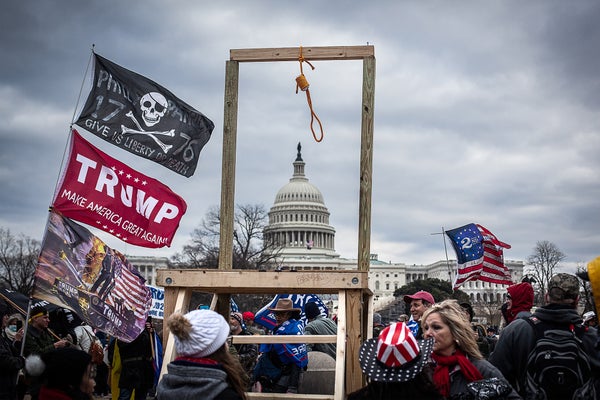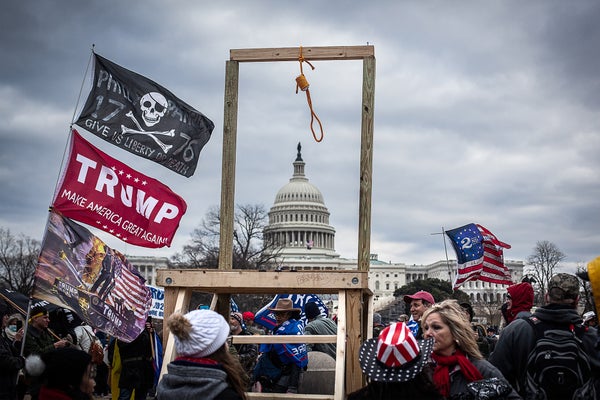February 15, 2024
4 min read
U.S. elected officials must protect public health and the foundations of our democracy by limiting the intrusion of guns into politics

Trump supporters near the U.S Capitol, on January 06, 2021 in Washington, DC.
Three years after the January 6 attack on the Capitol, the U.S. finds itself at a crossroads of democracy. Inflamed by inciteful rhetoric, a “deeply disturbing spike” in threats against elected officials and perceived political foes has prompted increased attention from the Justice Department. These threats are made all the more chilling when coupled with permissive access to firearms in the U.S., the display of firearms in public, and all too often, their use.
Our nation’s election officials and poll workers already find themselves squarely in the sights of those seeking to undermine democracy through intimidation, notably MAGA politicians and their followers. A 2022 poll from the Brennan Center for Justice at the New York University School of Law found one in six election officials say they have been threatened for their work. More than half voiced concerns about the safety of fellow election workers. The same poll found 30 percent of officials knew of one or more election workers who left their position in part because of fear for their safety. A jury also recently awarded Georgia election workers $148 million in damages because of Rudy Giuliani’s false conspiracy theories that led to racist threats and harassment after the 2020 election. Given these facts, it stands to reason that the threat of armed intimidation can make people less likely to participate in our democratic process, as either candidates, poll workers or voters.
In political spaces, firearms endanger both public health and elections. Despite the spiraling threats and angry rhetoric of recent years, political violence, especially with firearms, is not a foregone conclusion in the U.S. Elected officials can and must act before this year’s general election in November to protect public health, civil rights and liberties, and the foundation of our democracy: voting.
On supporting science journalism
If you’re enjoying this article, consider supporting our award-winning journalism by subscribing. By purchasing a subscription you are helping to ensure the future of impactful stories about the discoveries and ideas shaping our world today.
Understandably much of the focus on the January 6 Capitol insurrection surrounds its mass violence, trespassing, destruction of property, theft and worse. But there is much less discussion of what did not happen. Namely, the lack of gun violence by rioters. That was no coincidence. Members of the Oath Keepers admitted in court that they stockpiled firearms in Virginia ahead of January 6 because of D.C.’s strong gun laws. Compare that with intimidation voters faced from armed “poll watchers” during the 2022 midterm elections in Arizona, a state with permissive firearm laws. These contrasting examples highlight the value of such laws and the potential consequences of their absence.
Threats of violence, especially armed violence, have been shaping perceptions of American democracy ahead of the 2024 elections. In a December survey 83 percent of Americans expressed concern about the threat of political violence in the U.S. today. In a similar vein a poll conducted by the University of Massachusetts Amherst in 2023 found that 84 percent of almost 300 former members of Congress were concerned about election-related violence this year. Their fears are validated by elected officials and candidates who continue to downplay, excuse or even encourage insurrectionism, creating the conditions for such incidents to take place again. Former president Trump has notoriously predicted “bedlam” if the criminal charges he faces affect the outcome of the upcoming election, and he has failed to categorically reject political violence.
Americans see violence on the horizon as a result, but they do not have to succumb to it. If something can be predicted, then it can be prevented with the right tools.
My colleagues and I at the Johns Hopkins Bloomberg School of Public Health’s Center for Gun Violence Solutions recently released a report detailing policy and practice recommendations for lawmakers can advance to help reduce threats of political violence. A good start would be to prohibit civilian possession of firearms in locations essential to political participation, such as polling places and legislative buildings, as well as at protests, to protect the core functions of government. We can help prevent attacks by enacting and implementing extreme risk protection order (ERPO) laws to temporarily disarm people found by a court to pose a high risk of violence. Beyond lone individuals, our leaders must also better regulate extremist militia organizations, like the ones that participated in the insurrection on January 6, and loosen or repeal state preemption laws that prevent local governments from making laws more protective than state law.
Finally, and perhaps most critically, all Americans must openly denounce violence and other intimidation tactics used by insurrectionists. This behavior thrives in silence. We must stand up to the threat of violence and show it has no place in our country.
Evidence-informed gun safety measures can make a meaningful difference in preventing armed political violence and intimidation. We are already seeing these differences play out in some states. For instance, Virginia and Colorado have implemented a suite of laws to promote voter safety and participation in the democratic process since 2021. Both states have banned firearms from polling places and their capitols. However, more must be done at the local, state and federal levels. Other lawmakers must enact similar protections in their own states.
With the 2024 election cycle underway and millions of Americans heading to the polls, there is still time to fortify our democracy. Elected officials must not only condemn dangerous rhetoric that fuels the flames of violence, but also advance concrete gun safety measures that preserve public health, safety and the heart of American democracy: our elections.
This is an opinion and analysis article, and the views expressed by the author or authors are not necessarily those of Scientific American.
